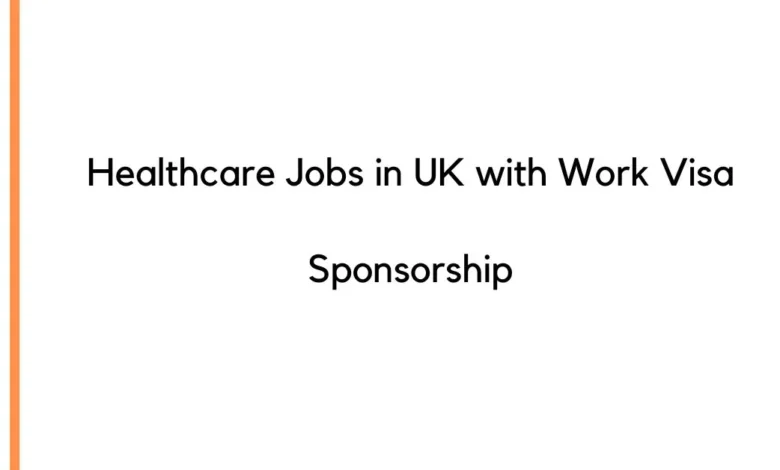Healthcare Jobs in UK with Work Visa Sponsorship 2025

The UK’s healthcare industry is in great demand and provides both domestic and foreign workers with fantastic employment prospects. One of the biggest employers in the world is the UK’s healthcare sector, particularly the National Health Service (NHS). Many healthcare positions will be open, and many of them will sponsor work visas to draw in qualified foreign workers.
The UK is actively looking for foreign professionals to fill important posts, whether you are a therapist, doctor, nurse, or healthcare assistant. The kinds of healthcare jobs that are available, the expected salaries, the qualifications required, and the process for applying for healthcare jobs in the UK with a sponsored work visa will all be covered in this article.
Why There is Demand for Healthcare Jobs in UK?
A number of factors, such as an ageing population, rising healthcare demands, and staff shortages in the NHS and commercial healthcare sectors, have contributed to the large increase in demand for healthcare jobs in the UK in recent years. The UK is providing work visa sponsorship to bridge the gaps and expanding opportunities for international healthcare professionals in order to solve these issues.
1. Aging Population
- The need for healthcare services has increased in the UK due to an ageing population, especially in areas like rehabilitation, chronic disease management, and elder care. Healthcare workers, including physicians, nurses, physiotherapists, and healthcare assistants, are now in more demand as a result
2. Post-Pandemic Healthcare Demands
- The COVID-19 pandemic had a major effect on the healthcare industry, which raised the need for doctors. More healthcare professionals are needed to satisfy the rising demand for treatments, immunisations, and rehabilitation services as a result of the pandemic’s aftermath.
3. Staff Shortages in the NHS
- There have been persistent staffing shortages in the NHS, especially in general practice, mental health services, and nursing. The UK government has increased its attempts to hire foreign healthcare personnel through visa sponsorship schemes in response to these shortages.
4. International Recruitment Initiatives
- To draw in foreign medical professionals, the UK government has launched a number of international recruitment campaigns. These initiatives facilitate the process of obtaining work visas and employment in the healthcare sector for skilled professionals from non-UK nations.
Read Also: Clinical Coordinator Jobs in UK with Visa Sponsorship
Types of Healthcare Jobs in UK with Work Visa Sponsorship 2025:
International workers can choose from a variety of healthcare jobs in the UK, including positions in both the public and private healthcare systems. Jobs that frequently sponsor visas include:
1. Nurses
- One of the most sought-after occupations in the UK is nursing. Hospitals and community care settings offer opportunities for registered nurses, nurse practitioners, and speciality nurses (including paediatric, cancer, and mental health nurses).
2. Doctors and General Practitioners (GPs)
- General practitioners (GPs), specialists, and surgeons are among the medical professionals in high demand in the UK for positions in primary care facilities, clinics, and hospitals. In underserved populations and rural places, general practitioners are especially needed.
3. Healthcare Assistants (HCAs)
- By helping with patient care, such as feeding, bathing, and mobility aid, healthcare assistants give nurses and physicians vital support. In community healthcare settings, assisted living facilities, and hospitals, HCAs play a critical role.
4. Physiotherapists
- In order to assist patients in recovering from operations, injuries, or chronic illnesses, physiotherapists are in high demand. They treat patients to increase their mobility and physical function in hospitals, rehab facilities, and private clinics.
5. Medical Laboratory Technicians
- Diagnostic testing in labs and hospitals is the responsibility of medical laboratory technologists. They are an essential component of the healthcare system because of the work they conduct to help doctors diagnose illnesses.
6. Radiographers
- Radiographers are essential in the diagnosis and treatment of medical diseases using imaging methods including CT, MRI, and X-rays. As diagnostic imaging plays a bigger role in patient care, this discipline is expanding.
7. Pharmacists
- Hospitals, neighbourhood pharmacies, and research institutes all require pharmacists. They are essential in giving out prescriptions, counselling patients on how to take them, and helping other medical professionals oversee patient care.
Salary Expectations:
The role, degree of experience, and region all affect healthcare job salaries in the UK. While earnings in the commercial sector may vary, healthcare personnel in the NHS are compensated based on a standardised pay system called the Agenda for Change (AfC).
1. Nurses
- NHS nurses make between £27,055 and £40,588 a year, depending on their specialisation and level of experience. More money can be made by senior nurses or specialists, especially in fields with high demand like critical care or mental health.
- Nurses in the private sector could make a little more money, particularly in private hospitals or speciality clinics.
2. Doctors and GPs
- Experienced physicians and specialists can make between £45,124 and £77,519 per year, while junior doctors begin with earnings between £29,384 and £34,012.
- Depending on location and experience, general practitioners (GPs) can make anything from £60,000 to £100,000, especially in underprivileged areas.
3. Healthcare Assistants
- In the NHS, healthcare assistants make between £21,000 and £25,000 a year, with the possibility of earning more in agency work or private care facilities.
4. Physiotherapists
- Depending on their expertise level, physiotherapists employed by the NHS make between £26,000 and £38,000 annually. Physiotherapists in private practice, especially those with specialised training, may be paid more.
5. Medical Laboratory Technicians
- The annual salary range for medical laboratory technologists varies based on their level of experience and the kind of laboratory they work in, from £25,000 to £37,000.
6. Radiographers
- In the NHS, radiographers make between £25,655 and £39,027 per year, with higher pay available for specialised positions in CT or MRI scanning.
7. Pharmacists
- Pharmacists make between £32,000 and £45,000 annually, with the possibility of earning more in senior positions in the private sector.
Requirements:
Candidates must fulfil particular qualifications and professional registration requirements in order to be eligible for healthcare jobs in the UK with visa sponsorship. While the prerequisites for various roles vary, the following are the common requirements:
1. Relevant Qualifications
- In their field, candidates must possess a recognised qualification. Doctors must hold a medical degree, and nurses must hold a bachelor’s degree in nursing. Relevant degrees or diplomas are also necessary for other positions, like physiotherapists or chemists.
2. Registration with a UK Professional Body
- In the UK, healthcare practitioners need to be registered with the relevant regulatory body:
- Nurses and Midwives: Nursing and Midwifery Council (NMC)
- Doctors: General Medical Council (GMC)
- Physiotherapists: Health and Care Professions Council (HCPC)
- Pharmacists: General Pharmaceutical Council (GPhC)
- In order to register, foreign healthcare workers must make sure their credentials match UK requirements and pass any necessary tests or examinations.
3. English Language Proficiency
- Every healthcare professional is required to show that they are proficient in English. Passing an English language exam, such as the Occupational English Test (OET) or the International English Language Testing System (IELTS), can demonstrate this.
4. Visa Eligibility
- Visa requirements must be met by foreign workers applying for healthcare positions. The most popular path for healthcare workers is the skilled worker visa, which permits them to work in the UK for a maximum of five years. Companies that sponsor visas will help with the application procedure.
How to Apply?
Conclusion:
Excellent employment opportunities are available in the UK healthcare industry for both native and foreign specialists. It is a desirable location for healthcare workers due to its rising demand, opportunities for visa sponsorship, and competitive pay. Applying for a UK healthcare job could be the next step in developing your career in a vital and booming industry if you meet the standards and have the necessary certifications.
Frequently Asked Questions:
-
What qualifications are needed for healthcare jobs in UK?
Candidates must hold relevant degrees or diplomas and be registered with professional bodies like the NMC (for nurses) or GMC (for doctors).
-
Do I need to prove my English proficiency?
Yes, foreign healthcare professionals must pass an English proficiency test such as IELTS or OET.



